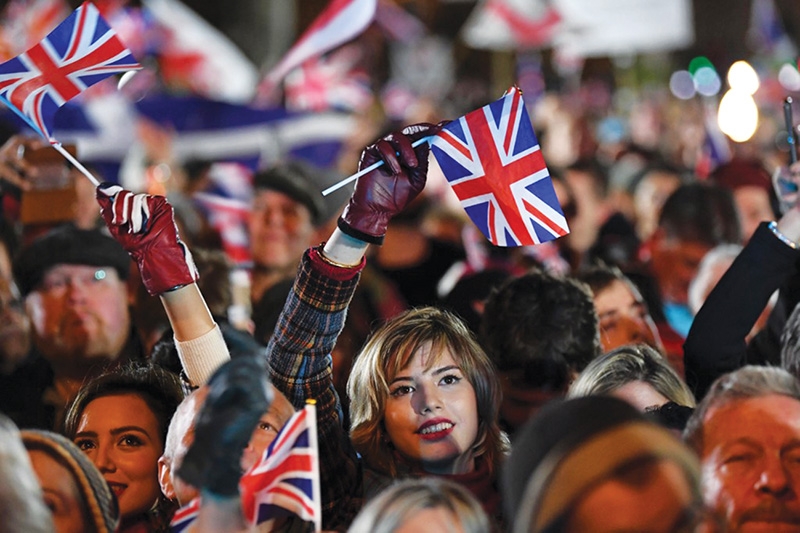UK and EU set out goals for trade deal
 |
| After the recent Brexit, people in the UK are hoping for decent and fair trade deals with the EU and other partners Photo: AFP |
The United Kingdom of Great Britain and Northern Ireland officially left the European Union at 11pm UK time on January 31, and entered into an 11-month transition phase, despite two of the constituent countries (Scotland and Northern Ireland) voting to remain in the bloc when the country went to the polls in 2016.
That vote, won by the Leave side on a percentage of 52-48, has resulted in over three years of wrangling and heated discussion both within the UK and the other 27 nations that comprise the EU on how exactly a country with the status of the UK leaves such a massive trading bloc in an orderly fashion.
Now that the country has officially exited, UK Foreign Office staff have been banned from using certain words and phrases in discussing Brexit, including the word itself, unless in certain narrow circumstances. The directive underlines the degree to which the government is determined to frame Britain’s departure from the EU as a clean break.
The opening sentence of the directive stated that, “Brexit is completed. So do not use the term, save as a historical event that took place on January 31, 2020”.
Now focus is to be placed on negotiations over the future relationship, which is expected to start in early March. An EU official confirmed a report in December from The Guardian that the next phase of talks would take place in both London and Brussels, Belgium.
Just days after officially leaving, the gap between the UK and the EU on hopes for the transition phase appeared to be a wide one.
Working on a deal
In negotiations to create a major free trade deal, Brussels is expecting the UK to “dynamically align” on state aid and competition regulations to prevent the British government from subsidising parts of the economy such as in the steel, aerospace, or automobile industries.
The EU’s chief negotiator during Britain’s withdrawal, Michel Barnier said last week, “The text of the political declaration talks about a level playing field and the objective of having fair and open competition. Both sides say that we are keen to avoid any distortion of competition and any unfair competitive advantages.”
Barnier said a level playing field had to be a condition for a zero-tariff, zero-quota deal. “We are in favour of free trade but we are not going to be naive,” he added.
UK Prime Minister Boris Johnson, on the other hand, insisted that Britain should not abide by EU rules any more than Brussels should have to follow UK regulations after Brexit.
“There is no need for a free trade agreement (FTA) to involve accepting EU rules on competition policy, subsidies, social protection, the environment, or anything similar, any more than the EU should be obliged to accept UK rules,” Johnson said.
In a speech last week to mark the UK’s new social and economic journey outside of the EU, Johnson explained his vision of setting out into the world, moving on from the tangled debate over withdrawal, and using new powers to create its own path.
“I have no doubt that Britain will prosper. And of course our new relationship with our closest neighbours will range far beyond trade. We will seek a pragmatic agreement on security, protecting our citizens without trespassing on the autonomy of our respective legal systems,” Johnson said.
The goal for both sides is to create an FTA, but also additional deals that touch on other issues revolving around security and foreign policy. To the surprise of many outsiders, Britain wants to wrap things up by the end of the year, a deadline seen as breathtakingly optimistic by many trade experts. But even though time is short, it will take a little time before talks really get going.
“This is the early phase, and the chest-beating phase of the negotiation,” said Sam Lowe, senior research fellow at the Centre for European Reform in London. “In the next couple of months we will see both sides standing firm and appealing to domestic audiences.”
Along with fear of subsidy of parts of the economy by the UK, the EU argues that its negotiation stance is vital to prevent Britain, a relatively large nearby competitor, from lowering labour and environmental standards which would, in turn, bring down the price of goods and services.
The British, meanwhile, pointed out that such conditions were not imposed on Canada in exchange for its FTA with the Europeans.
Negotiations for a trade deal between Canada and the EU began in 2009 and ended five years later – and, though the deal was approved by the EU in 2017, even today only parts of the deal have been provisionally applied. If any UK-EU deal is created in less than a year, insiders expect it to be a bare bones agreement covering only particular, sensitive, or important areas.
PM Johnson maintained last week that rather than accept alignment with European rules, he would prefer a trading relationship similar to that of Australia, which currently has no FTA with the EU.
“The choice is emphatically not deal or no deal. The question is whether we agree a trading relationship with the EU comparable to Canada’s, or more like Australia’s,” Johnson stated.
Choosing the next path
Both of those arrangements would be a distinct change from the pre-Brexit status, and create advantages and disadvantages for the country.
The EU’s deal with Canada was regularly mentioned during the Brexit campaign and seems to have emerged as the prime minister’s preferred model. The agreement is popular among some in the UK because it allows free trade without remaining in the EU’s single market, removing the need for aligned rules and free movement of people.
Under such an arrangement, Britain would stop paying financial contributions to the EU budget and the UK would regain control of its immigration rules and other internal regulations.
It would, however, be a sizable downgrade from the UK’s current trade relationship with the bloc, as it will create trade and regulation barriers that have not been in force for decades.
In terms of Johnson mentioning a less-concrete arrangement like that with Australia, experts note that it is essentially a rebranding of the nuclear option of a “no deal” Brexit – referring to the possibility of the UK leaving without any deal at all. It would involve doing business on World Trade Organization (WTO) terms in most areas, with tariffs on goods and an agreement on the processes to reduce several regulatory barriers.
Australia and the EU began negotiations for an FTA in 2018. The EU as a whole is Australia’s second-largest trading partner and third-largest export destination.
The current arrangement between the two does not bind Australia to EU regulatory oversight or immigration rules, and Australia does not have to make financial contributions to the EU budget.
The UK government would be happy with that situation – however, Australia is not a member of the European customs union or single market. That means its goods exporters are subject to EU tariffs and quotas, and Australian service providers do not have preferential access to the continent.
Each of the remaining 27 member states will have veto rights over the new agreement with the UK. While the bloc kept a largely united front during Brexit withdrawal talks, the stance of some members could shift as varying countries will be affected by different elements of any potential trade deal.
In some areas, such as the minimum wage, maternity leave, and the elimination of single-use plastics, British standards already significantly exceed EU minimums.
For now, British citizens are no longer EU citizens; British ministers will play no further part in EU lawmaking; and no British prime minister will attend EU summits. If PM Johnson does not ask for a transition phase extension by June (which he insists will not happen), the UK is at risk of falling back on basic WTO terms after 2021, with untold economical and logistical consequences for the country.
It is now up to those in charge to thrash out a deal that is at least somewhat acceptable to both sides, and one which protects citizens both in the UK and further afield.
| Dr. Cuong Phu Nguyen - Associate at Design Studio Architects
What will be the consequence of this historic decision? No one can predict for sure. Within the UK, the average ratio of supporters and opponents of this decision was almost equal, 52 to 48 per cent in favour, and uneven across regions. Each party has good reasons to defend their opinions enthusiastically. Whether for or against, however, Brexit now has happened. After more than three years of negotiations, the common aspiration of the people was to conclude this lengthy and divisive process. The incumbent government of Prime Minister Boris Johnson has succeeded in breaking the deadlock in withdrawal negotiations with the EU, and overcome internal inconsistencies within the British Parliament to deliver this extremely difficult task. Thanks to this achievement, the prime minister earned a landslide victory in the December election, with a majority of parliamentary seats, and outstripped the opposition Labour Party, which had an unclear view on Brexit. Recalling the above helps to understand Brexit’s context, its complexity, and the multifaceted aspects. This, hopefully, can help us make objective judgments and valid predictions on the impact of Brexit. Some British people have a very high national pride. Although the British society is somewhat traditional, it always upholds the spirit of the rule of law and is open, multiethnical, and multicultural. Therefore, I think foreigners living, working, and studying in the UK will not be discriminated against because of Brexit. Nguyen Duy Dong - Real estate company owner in the UK
I was going to vote for the UK to stay in the EU because it could benefit my business in real estate. I believed the country’s real estate would be vibrant and maintain a stable growth rate if the UK continued to be a member of the EU, unless the demand for housing reduced, in which case my business would face some challenges for the next few years. But then I changed my mind and voted for Brexit, because I saw the non-conformity between the UK and the EU. Most EU members are stagnant with modest growth. I felt the lack of attachment between the UK and other EU members, and the political intrigue made people tired of the whole thing. I believe that leaving the EU will make the UK better by changing the way they manage and operate. The aftermath of Brexit could cause some difficulties for my business in the short term, but I am ready to face and overcome them. Cao Minh Quan - University student in Essex
There are no doubts that there will be changes in everyday life for British citizens in the future, however these changes might not be significant depending upon whether a trade deal can be negotiated. The effect is even lower on international communities living in the UK, the Vietnamese for example. |
What the stars mean:
★ Poor ★ ★ Promising ★★★ Good ★★★★ Very good ★★★★★ Exceptional
Related Contents
Latest News
More News
- NAB Innovation Centre underscores Vietnam’s appeal for tech investment (January 30, 2026 | 11:16)
- Vietnam moves towards market-based fuel management with E10 rollout (January 30, 2026 | 11:10)
- Vietnam startup funding enters a period of capital reset (January 30, 2026 | 11:06)
- Vietnam strengthens public debt management with World Bank and IMF (January 30, 2026 | 11:00)
- PM inspects APEC 2027 project progress in An Giang province (January 29, 2026 | 09:00)
- Vietnam among the world’s top 15 trading nations (January 28, 2026 | 17:12)
- Vietnam accelerates preparations for arbitration centre linked to new financial hub (January 28, 2026 | 17:09)
- Vietnam's IPO market on recovery trajectory (January 28, 2026 | 17:04)
- Digital economy takes centre stage in Vietnam’s new growth model (January 28, 2026 | 11:43)
- EU Council president to visit Vietnam amid partnership upgrade (January 28, 2026 | 11:00)




 Tag:
Tag:




















 Mobile Version
Mobile Version